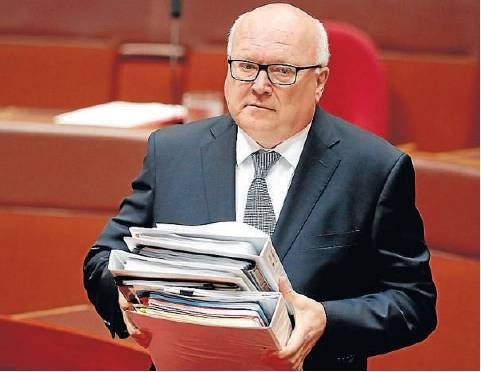Same-sex marriage supporters are hopeful senators could pass a bill to legalise gay weddings as soon as today with conservatives’ demands to build in religious freedoms crumbling and other amendments being dealt with quickly.
If the bill is passed, Malcolm Turnbull’s decision to cancel Parliament for lower house MPs this week could cause the government further embarrassment because they would have been able to begin debate tomorrow if they had been in Canberra.
Labor’s affirmation to bind its MPs and senators– even those opposed to gay marriage – to vote against substantive amendments to Liberal Senate Dean Smith’s private members bill has given advocates from the Liberals and Labor the numbers easily to defeat amendmentsproposedbyCoalitionbackbenchers, the Greens and other crossbenchers.
By yesterday afternoon, there were signs that those proposing amendments were not filibustering to drag out debate.
The only amendments to be passed were a series of technical changes Attorney-General George Brandis put forward.
Senator Brandis has a separate sheet of amendments, expected to be dealt with today, that may attract some support from the crossbench and progay marriage Liberals. These amendments would allow a current and future civil celebrant to refuse to marry a gay couple if it was at odds with their religious or conscientious beliefs.
Senator Smith’s bill only extends this protection to current celebrants who register as a religious marriage celebrant.
Labor’s decision has killed off a rearguard effort by conservatives for sweeping religious protections, which included protections for faith-based charities, shield laws protecting people and organisations from public bodies taking detrimental action and enshrinement of parental rights around sex education for their children.
The Greens have produced amendments so that the marriage law would not limit state and territory antidiscrimination laws and remove Senator Smith’s grandfathering provision around civil celebrants, meaning none of them could refuse to marry a gay couple.
Liberal Democrat David Leyonhjelm has flagged amendments to allow commercial wedding service providers like florists and bakers to legally refuse to serve gay couples will also be defeated, while One Nation’s amendments are similar to Senator Brandis’s.
While at least three Labor senators, including deputy leader Don Farrell, will vote against legalising same-sex marriage, Opposition Senate leader Penny Wong and shadow attorneygeneral Mark Dreyfus said Labor would collectively vote against substantive amendments, arguing that the bill was the product of a cross-party committee and acceptable compromises had been negotiated.
‘‘We do so with the very clear intention that we need to get this done. It’s not a time for concentrating on issues that have got little or nothing to do with achieving marriage equality in Australia,’’ Mr Dreyfus said.
They said the issue of more broader religious protections should be dealt with by the inquiry headed by former attorney-general Phillip Ruddock, who was appointed last week. The inquiry will report next year.
In a passionate speech touching on past civil rights fights in Australia, Senator Brandis said Mr Turnbull had been the first prime minister to have prosecuted the case for samesex marriage. Its legalisation after the resounding Yes vote would stand as a signature achievement of his government.
‘‘It rises above tawdry day-to-day politics as an imperishable legacy,’’ he said.
‘‘I predict that, like the 1967 referendum, this decision by the Australian people, enabled by their government and enacted by their Parliament, will come to be seen as one of those occasional shining moments which stand out in our nation’s history, about which people will still speak with admiration in decades, indeed in centuries to come.’’
Mr Turnbull and Leader of the House Christopher Pyne last week decided to push back the resumption of the House of Representatives until December 4, arguing that the Senate deliberations into the same-sex marriage bill was likely to drag on and MPs would have nothing else to debate.
The decision was met with widespread scorn and prompted accusations the government was trying to avoid its lack of a working majority being exposed on the floor of parliament and prevent rebel Nationals crossing the floor to support the establishment of a banking inquiry.
